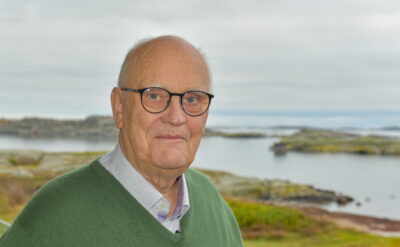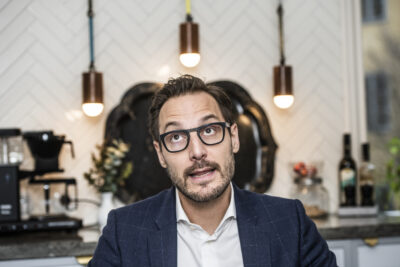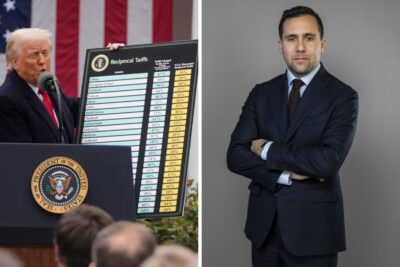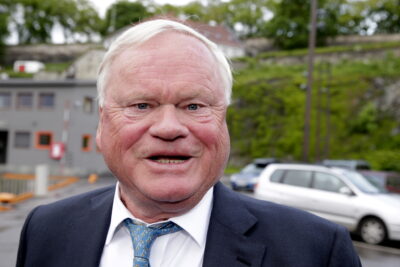Astra Zeneca
Soriot: ”My son never had a single fist fight in his whole life, and I had so many”
This interview was originally published in Swedish in the print magazine, but is here available for our English speaking readers as a lengthy Q&A – session.
INTERVIEWER, CALLE FROSTE: You’ve been with AstraZeneca for four years now. How long will you stay around?
RESPONDENT, PASCAL SORIOT: As long as it takes.
CF: Tom McKillop was in charge for seven years and David Brennan for six years, You’ve been the CEO for four years.
PS: Four years, time flies. But you know if you look at it in our industry the cycles are quite long. And we’re only half way through the river. We’re crossing the river. I can see the other side of the river now. But I’m not on the other side of the river. So we are half way through this journey on. So I hope I’m here another four years.
CF:I understand. Where is home for you? Is that Australia or France or?
PS: It’s Australia, yeah. I’ve been everywhere I have to say, and I feel home everywhere, but Australia is my …
CF: How often are you in Australia?
PS: Three times a year only. I miss my grandson that’s for sure.
CF: You have a daughter and a son?
PS: Yeah, they both live in Australia, and my wife spends four months a year in Australia. But I travel a lot and I miss my grandson.
CF: What do your children do? Are they in the pharmaceutical industry?
PS: No, no they are not, no they are not.
CF: Is your wife in the pharmaceutical industry?
PS: No, no my wife is not. My wife doesn’t work anymore. She’s taking care of the kids and she likes the grandson better than she likes me. So she’s with my grandson for most of the year.
CF: How old is your grandson?
PS: He’s eight.
CF: Does he play football?
PS: Yeah, he’s a fanatic. He loves football. He loves it. He plays cricket, he plays tennis. He’s really good at playing tennis. But it’s okay he loses sometimes.
CF: Where do they live?
PS:They live in Sydney. I don’t know if you’ve been to Sydney, but life in Sydney, Australia is very much like life in Sweden. Actually Swedes and Australians are a bit the same. People like the outdoor …
CF: There’s a big difference. There are no surfing opportunities here.
PS: But you have skiing opportunites. Different sports, different climates, similar lifestyle.
CF: I read you consider yourself as an adopted Australian?
PS: Australian, yes.
CF: Do you surf?
PS: I do a little bit, but my son is a big surfer. My son loves surfing. I love bike riding more than surfing I have to admit. My sport is bike riding. Bicycle riding.
CF: What kind of bike do you have?
PS: I have a road bike. I have a Cannondale.
CF: At what weight?
PS: Six and a half kilos. It’s a great bike. I have Shimano gears and it’s really a great bike.
CF: Where do you use it?
PS: At the weekend, every weekend I try to go biking.
CF: In Cambridge?
PS: Sometimes in Cambridge, sometimes I go to the Swiss Alps. I have several bikes. I have one in the Alps, I have one in the US and I have one in Cambridge.
CF: I read in the Financial Times that you had a tough childhood in the “banlieue”?
PS: Yeah, I grew up in a suburb that was not rich, that’s for sure, yeah.
CF: Which suburb was that?
PS: It was in the northern part of Paris. My parents lived in an area with high rise buildings. I had a pretty, I mean rough (time). Certainly, you had to fight for yourself that’s for sure, but I had a happy childhood no doubt.
CF: What were the fights about?
PS: Oh, kids fights, physical fights, you know …
CF:Fist fights?
PS: Yeah, that’s the way to do when you’re young kid.
CF: But I don’t remember me having one fist fight in my childhood?
PS: I know, I know. My son had zero fist fights. My son never fought. I think about it often. My son never had a single fist fight in his whole life, and I had so many. Until I was 18 and then I went to university and never had one after that. Before that I had many.I was fighting for myself you know.
CF:Was it in gangs?
PS: Yeah. I mean there were gangs, but I was in a team of people. I mean you know this is how it is in this “banlieue”. I mean you have your territory and you have to defend it. That’s how it works. But what you learn is … you learn the team spirit. You need to stand up for yourself. You need to learn. You learn to stand up for your friends and your team. That’s what you learn.
CF:You had a management meeting here yesterday. Why Gothenburg?
PS: Well, I come here a few times a year. But I did a few things.
One. We had … the whole executive committee met here. And I organized for them, for all of us to come to different sites, important sites, so that we don’t always meet in the UK. So we meet in China, we meet in the US, we meet in the UK. We meet here, so that was one goal to bring my leadership team here. Two years (ago)
Two. We had a town hall with the people who are here on site. And you know, answer their questions, because they have questions.
Three. We have a few other objectives, like meeting you and you know …
PHOTOGRAPHER, SÖREN HÅKANLIND: About the photos, is it okay to shoot all the time. Is it okey?
PS: Yeah, yeah you tell me. When you want.
SH: Okey.
PS: I’m here for you.
SH: Great!
PS: Yeah, okay.
“New Astra Zeneca”
CF:I want to know, do you position yourself as a scientist rather than a moneyman or a marketer?
PS: A little bit of both, I mean a scientist to start with. But you know, in our industry it starts with good science, to produce good medicines. But then you have to make sure you bring them to as many patients as possible, so marketing is also important. I give you an example. We have just launched a new drug for cancer. For a specific type of cancer, lung cancer with a so-called Eg5EGFR-mutation and patients have a special resistance to that mutation. To treat patients you have to diagnose them. And even in the United States, not every patient is tested, And if they are not tested, and they can’t get the drug, they die actually. And so for instance making sure we educate physicians so that every patient is tested is part of marketing. And if we don’t do that, the drug is not going to reach patients. So I’m a scientist at heart, but I think marketing is also important.
CF: I have read that you love learning in the laboratories, is that true?
PS: No, I didn’t learn in the laboratory, but I spent a lot of time in the lab with people.
CF: I see, you’re signaling a new message, in last week’s third quarter presentation, you’re signaling “New Astra Zeneca” in several PowerPoint slides. What’s this “New Astra Zeneca”?
PS: Well the “New Astra Zeneca” is the company that is emerging after we finish with our patent expiries. You know, Astra Zeneca many years ago invented several very important medicines, Crestor, Nexium which was invented here also, Seroquel was invented in Sweden actually, and a few other products. And these products lost patent protection over the last three years. So to give you an idea, in 2011 out of 30 billion dollars of sales, we had almost 20 billion coming from products, that are losing patent protection.
CF: These years now?
PS: Yeah, so from 2011 we’ve lost 20 billion in sales almost. In fact the 20 billion are becoming two, two and a half billion by 2018. So we will have lost 17 billion of sales to patent expiries. So that’s a big, big issue of course, big headwind. But under this, there’s a new AstraZeneca, which is emerging. And this AstraZeneca is made of innovative products, and it’s focused on oncology, cardiovascular, diabetes and respiratory disease. And it’s a company that is growing fast, and it’s launching new products in those three core areas. This is what I call the “New Astra Zeneca”, the innovative Astra Zeneca that is launching new products, and will have no patent expiry until 2024.
PS: Basically we are finished with our patent expiries by 2017, early 2018. And then we have no patent expiry until 2025 almost, 2024. Until then no patent expiry.
CF: I come back to these questions. Swedes tend to describe Astra Zeneca as a partly Swedish company, what’s your view of that?
PS: Well, you know, I think in this world, we are all global citizens, and companies are global companies. We are a global company, but you need to remember your roots. I’m a global citizen, but I remember my roots and the company’s roots are in Sweden and in the UK. I was born in France, my children live in Australia, that’s where my roots are, but I’m a global citizen, and the company is a global company.
CF: I understand that Katarina Ageborg, the Chief Compliance Officer, is the only one in the management that’s working out of Sweden?
PS: Well we have Katarina who works out of Sweden, and then in the development team, we have Elisabeth Björk who is the Head of Cardiovascular/Diabetes. She is based here also. She doesn’t report to me, she reports to our CMO (chief medical officer), but she’s a very senior leader in the organization. And the Head of Research for Cardiovascular diseases is also here. The Head of Research for Respiratory diseases is also here. And also we have quite a number of senior leaders based here.
CF: But having the top management in Sweden and in Cambridge and elsewhere … is that a strategic advantage?
PS: Yeah, basically we are based on three main sites. One is Gothenburg, one is Cambridge, and the last one is Gaithersburg in the US near Washington. Those are the three main sites. And our leadership team is spread across those three sites. So …
CF: How do you run the company?
PS: Well, actually we run the company by, you know, we have basically concentrated the global teams in Sweden and in Cambridge for cardiovascular and respiratory diseases. And so we are running Cambridge and Gothenburg as if they were integrated. We have an Astra Zeneca flight that goes back and forth every day between Gothenburg and Cambridge airport. And for oncology they are concentrated in the US and in Cambridge. And for the leadership team we use technology. We use tele-presence, We have a tremendous network of video conferences and tele-presences.
CF: How often do you meet as you did yesterday?
PS: I meet, well we meet in the team every month, once. And we meet physically three, four times a year. The rest of the time we meet by tele-presence, by video conference. And we have a great network, in fact this year, the whole company has reduced its travel budget by 25 percent. Because we told people, you know, we have a tremendous network of tele-presence and we want to use that. So now people are able to use their laptop, If you’re familiar with tele-presence, it’s better than video conference. In every meeting I’m in myself, we have three, or four, or five sets of people connected from everywhere. We have to operate like this, we have no choice. We are truly global.
CF: I understand that Mölndal here is one of the three research units in Astra Zeneca. And that was stated out three years ago. For how long is that decision valid?
PS: Well as long as we produce new products here. You know we just need to be successful and the question is really if we produce. If this site invents new medicines, then it will be here forever. I mean this is a very important site for us. And in cardiovascular/diabetes this site is coming up with good medicines. Respiratory we have products also, so you know, so far it is a very productive site. But we also have a presence in Södertälje, near Stockholm.
CF: But the research?
PS: Research is here, yeah.
CF: Can you confirm that the reason for closing the Södertälje research and development facility was that they were digging into Alzheimer’s disease and that they came out with practically nothing?
PS: It is … first of all yes it’s correct. We were working on the Alzheimer’s disease/CNS (central nerve system), and we had to simplify out network, We had to many research sites. And it is true that there were not a lot of products coming out of this unit … there’s one product in the end, that came out. That we have … started developing.
CF:This one. AZD3293?
PS: That’s right, developing with Lilly for Alzheimer’s disease. There weren’t a lot of products, but mostly we needed to simplify our research network. We had too many sites.
CF: Why is it that you want to share future incomes with Lilly?
PS: Because we can’t develop everything ourselves. We have decided to focus on oncology, in cardiovascular diabetes and respiratory disease. And in CNS we don’t have the development teams, the development capabilities. We don’t have the commercial teams. So we couldn’t do it ourselves. And Lilly is a very strong Alzheimer’s company, they are very strong in CNS, so they are developing this product very, very quickly. And commercially they will do a good job. So we will get 50 percent of a big product, if it works, rather than 100 percent of a very small product, because there is a lot of competition. Merck, Biogen. There is competition in this field, and we need to move very quickly. And if we had done it ourselves, we wouldn’t have been as fast.
CF:When will it emerge then if you are successful?
PS: 2019 we’ll know. So another couple of years, it will take time. But if it works it will be very big. But you know, we will only know by then.
PFIZER BID
CF: It´s three years now this coming spring since the Pfizer bid. And the share price is now traded at lower levels than the bid.
PS: Yeah.
CF: What reactions do you get from shareholders?
PS: Well the first thing to remember for you but also the shareholders, is that the offer that Pfizer made at the time would never have existed, because as you probably remember, the US government stepped in, in September of that year and changed the rules. And so the tax inversion that Pfizer was planning couldn’t have taken place.
CF: They were about to use the fact that you were a British company?
PS: Yeah they were going to use the fact that it is a British company. They wanted to relocate their head office to the UK, and their tax office mostly. And they wanted to save a lot of taxes. And then the US government said: no, you can’t do that. And the US government they derailed the AbbVie/Shire deal if you remember, based on that. And then Pfizer tried again with Allergan last year.
CF:The Irish company?
PS: Yeah, and it didn’t work either because the US Government stepped in and said … Allergan said yes to the offer, and the US government stepped in and said: no, you can’t do that. So they had to stop. So that’s why I’m saying our deal would never have happened. So it was a mirage if you will, it was a price that could never exist. That’s point one, point two is we never said we would get to that offer price in two years time. We said our company has more value long term. So we still believe that we will exceed this share price. We believe that next year with the news flow we have, people should start seeing the value we create in our pipeline and our share price should over time reflect a value that is higher than the 55 pounds that we were offered.
CF: We read the rumors every week about new bids. This week it’s Novartis?.
PS: Yes. Well, I mean essentially you will continue hearing about those because you know what does it tell you? It tells you the company Astra Zeneca is an attractive company and why is it an attractive company? Because you have an attractive pipeline.
CF:Has there been any suitors since the Pfizer bid?
PS: We never comment on these rumors as you can imagine. But we hear the rumors like you do, and they’re not surprising because people look at our pipeline and they’re interested in our pipeline. So it actually shows you that other companies would agree with us that there is value in our pipeline and the company is more valuable than the current share price would indicate.
LONG TERM PLAN FOR 2023
CF: A key area for your future success is that you, in the coming years, will be able to raise your sales?
PS: Yeah.
CF: And the last figure I read about sales were 41 billion USD in 2023.
PS: Yes.
CF: Can that number be changed again?
PS: So far we just finished our long range plan and we presented the long range plan to our board and our chairman. who is Leif Johansson you probably know. We presented the plan to the board three weeks ago and we have another discussion with the board in December, and our forecast is still reflecting the same kind of number. So we’re still on the same trajectory of 41 billion for 2023.
PS: However, we believe we will have more oncology sales and less diabetes sales than we had forecasted originally. Why is that? Because you know we do very well with diabetes around the world, but in the US there is tremendous price pressure. So you know we have raised Farxiga (Astra Zenecas largest selling diabetes medicine) to 42 percent volume share globally. We are leaders, but in the US there’s currently tremendous price pressure. So the price pressure in the US means that we will have less sales by 2023 in diabetes, but we’ll have more sales with oncology.
CF:Next year your sales will reach a saddle point?
PS: Yeah?
CF: How will you maneuver to get the sales to reach yet another record?
PS: The old products’ decline is almost finished. By next year we have no sales left of Crestor and on Seroquel, so the growth of the new products will be emerging. The total company will be growing by the new products. That’s how we will drive growth, and we are launching new products. We are launching oncology products and we’ll launch … in 2018 we’ll launch Benralizumab (a medicine) for respiratory disease, and in 2019 we should launch the Triple (combination) for respiratory disease. We should launch Roxadustat and next year we should launch ZS-9 for hypercalemia. So we have many new products to launch.
SHARE PRICE
CF: But what you’re basically saying is that shareholders … the share price of the company is at the same level now as when the two companies merged 17 years ago.
PS: I don’t know if it is true actually.
CF: Based about 500 Swedish crowns now and then.
PS: I have not checked it. Do you know the answer to that? I don’t know.
JACOB LUND, DIRECTOR OF EXTERNAL COMMUNICATIONS: I don’t remember exactly what it was in 1999 but it’s certainly been much, much lower since then.
PS: What I can tell you is the change since I joined because this one I …
JL: I think when Pascal joined it was around 270 here in Sweden.
CF: You are the only CEO that has seen the share price rise in Astra Zeneca.
PS: I don’t know the answer before I joined. So we tracked it since January 2013, and we look at the so-called TSR, the Total Shareholder Return which is share price increase plus the dividend we pay. And our TSR is 90 percent. It’s the highest TSR in the London Stock Exchange. I assume it’s also the highest TSR in Sweden but I haven’t checked. I know in London it’s the highest TSR.
CF: You basically say that shareholders should be …
PS: Should be happy?
CF: Yes.
PS: Those who were here in 2013. If someone bought shares a couple of months ago maybe they’re not so happy, because the share price goes up and down. So you have to look at it over three, four, five years not over two months you know.
CONSOLIDATION
CF:I have a question concerning consolidation. It seems to continue but at a lower pace than earlier, why is that?
PS: Well, there has been a … science has made a lot of progress and there has been quite a wave of innovation in our industry, so we have a very strong pipeline, probably one of the best in the industry. But many other companies have also been able to produce new products, and so companies feel they can continue on their own because they have products.
In our industry it’s pretty simple. If you have new products that help patients you can do well on your own. If you don’t have new products then your only solution is to merge to reduce your cost base, and that’s what happens. So those companies that have good pipelines stay on their own. More companie have decided to stay on their own in the last few years, because science has made good progress. If you look at the treatment of cancer and many other diseases there’s a lot of progression.
CF: Does that mean new major mergers are coming up?
PS: I think personally there will be more mergers absolutely.
CF: Between the larger companies?
PS: Between larger companies because if you want to develop a new medicine that is really differentiated and will make a difference and be reimbursed, you have to really bet big on new science and that’s risky. So you would have to take two or three big bets and you’re not sure that they will work so you need to have critical mass. You need firepower financially because if one project doesn’t work or two projects don’t work the company has to survive. So if you have size and firepower you can take on a few projects.
CF: Can you… share with us … your view on the industry in five or ten years from now? Will the larger companies be even larger or will they …?
PS: I think some companies will be larger but I personally believe companies will have to specialize and there will also be a lot of collaborations. You know, for instance, we say we’re going to be specialized in cardiovascular, in oncology and respiratory, and then in CNS we will collaborate with Lilly and in dermatology we’ll collaborate with Leo in Denmark and with Allergan in the US. So you know I think companies will do more of this. There will be mergers, bigger companies, but there will also be companies that specialize and partner with others.
CF: What role will Astra Zeneca have in five years from now? Will it be an independent company as now?
PS: I don’t know. You know, you never know, you can never say, but we certainly are working hard to remain independent and succeed as an independent company. And again collaborating is one way to become bigger without merging, right?
CF:That is a new way for the industry?
PS: It’s a new way to operate but there will be a wave of mergers. We believe we can be independent. With 40 billion in sales you don’t need anybody else, you can remain independent, but it will really depend on whether we produce new products. If we produce new products we will be independent, if we don’t produce new products we will not be independent.
EXPENSIVE DRUGS
CF: New products and new medicines are sold at higher and higher prices. At the same time health care systems are having tighter and tighter budgets. I don’t see how they go together. Who will pay for new medicines?
PS: It’s a good point. I mean not all medicines are that expensive. Brilinta (diabetes) for instance costs maybe one dollar fifty, two dollars a day, right? It’s cheaper than a cappuccino coffee, right?
CF:But other companies sell medicines for 100 000 dollars per year.
PS: Yes, yes I’ll get to this. So you have the Brilinta of this world where you keep patients alive for a relatively low amount of money, and then you have the expensive ones, and we also have expensive products in development in cancer. And those of course create pressure on payers’ budget. But there will be savings coming from the biosimilars. You know there is a lot of …
CF: In another 10 or 15 years?
PS:No, no, no in the next three, four years … two, three years. (…)
There are biosimilars coming.
Biosimilars of (Amgens) Enbrel (rheumatoid arthritis) where launched in the Nordics and they took 90 percent of Enbrels market and the price was reduced by 50, 60 percent.
Then there will be biosimilars of Humira (breast cancer), Rituxan (cancer) and Avastin (cancer), next year or 2018. That will save the payers a lot of money over the next three, four, five years.
CF: But in the Swedish health care system and in the UK system I believe there are … the people responsible are hesitant to using the new drugs because they are too expensive.
PS: Yeah, so I think room will be made in the payers’ budget because the biosimilars for instance come and new generics come. That saves money, which they can spend on new drugs. So that’s one.
Second is they will look at new drugs and they will say, that new drug is expensive, so we really want to make sure it’s only used in the patients who will really benefit
And the third way is, companies will have to find creative models to be flexible. For instance in oncology the future treatment model is to combine products. We try to have many products in our pipeline so that we can price a combination at a lower price. So we want to combine all the products and give the payers a rebate, so it costs less. So there’s a whole range of things to do to manage the costs.
CF: That is a pay if it works system?
PS: Yes absolutely. There are all sorts of innovative methodologies the companies can use; pay when it works, or combine products and give a rebate for the combination. Or sometimes in China, what we do in China, is that the patients will pay the first three months and then they don’t pay after that. Or in some countries they don’t pay the first few months and if it works then they pay. So all sorts of different ways to help the patients and payers.
Immunotherapeutic cancer drugs
CF:I understand most of your research and development costs are now in the new cancer drugs.
PS: Half, about half, yeah.
CF:And the main focus area is the immunotherapeutic area. How much do you believe in this area ?
PS: Yeah. Well immuno-oncology is … two answers here. One is the impact of immuno-oncology on cancer as a whole and then how much we believe in our own products. So immuno-oncology oncology overall I think is totally transforming the cancer care. If you think about melanoma patients, skin cancer five years ago …
CF: Yes, there are two medicines against melanoma?
PS: Yes, absolutely. Two medicines from BMS but also one medicine from Merck. And so five years ago if you had melanoma you were dead. The question was not whether you were dead, the question was how long you would survive, which usually was only a little over six months. And today with immunology 30 percent, 35 percent of the patients live many, many, many, many years. Some of them are cured. Unfortunately not 100 percent, so we have to find new combinations to further increase the response. But it’s completely transformational. The overall survival there (with immuno-oncology) is far better than chemotherapy. Patients have less side effects and they live much, much longer. So Immuno-oncology is working and will transform the care.
CF:There are side effects also in these medicines?
PS: Yeah, but actually the side effects of immuno-oncology are less, much less than chemotherapy. And in fact over the last three, four years physicians have learned to manage the side effects. Those side effects are immune related because of course this immuno-oncology product … so you play with the immune system, physicians know how to deal with those, so they look at the side effects and if the side effects appear they act very quickly to block them. If you look at studies over the last three, four years the rate of side effects is dropping simply because physicians know how to deal with those side effects and they manage them much better.
CF: And you’re in this area?
PS: And us?
CF: Yes, and there are two companies that are ahead of you.
PS: Yeah. So the two companies that are ahead of us are BMS and Merck but they have a monotherapy approach. We are behind them, but we are ahead of them in a few indications. We are ahead of them in so-called adjuvant lung cancer which is very early treatment of lung cancer. We’re ahead of them in non resectable lung cancer, those lung cancers that cannot be operated on because the tumor is in a bad place. We’re ahead of them in first line … in combination. We are ahead of them in first lung line … first line bladder and first line head and neck cancer in combination. We’re ahead of them in small indications in monotherapy, durvalumab. And to be ahead of them in combination between durvalumab and tremelimumab. And here if it works we’ll be the leader.
CF: And you will release the answer to that question next year?
PS: Yes.
CF: In the Mystic study?
PS: That’s right, yes.
CF:How important is the Mystic-study for Astra?
PS: It is an important study, and that study has several arms. One arm is monotherapy durvalumab . Another arm is a combination of durva and tremlimumab. And so that’s important because it’s possible the study is totally negative, although it’s very unlikely.
There are a range of scenarios, probably the lower range of the scenario is that only monotherapy durva works. We know the chance of that is good because all the (other) products (in this area) /…/ work, so our products will work and we have other studies that show it works. So that’s really the minimum scenario, but if we only have this, we’re behind. If it works in all colors, we will be the leader and if it works only in monotherapy then we’ll be marketing that.
CF: What does the math say? How big is the chance that they will work?
PS: Well, the math tells us that the range of sales from monotherapy all the way to combination is very, very large.
CF: People tell me that there are game changers in the oncology care industry released every 20 years or so.
PS: Yeah.
CF:But after having been used for some years they don’t seem to be as game changing as they were believed to. There was a target seeking medicine developed by Astra I believe?
PS: We have Tagrisso …
CF: Twenty years ago.
PS: How long?
CF: Twenty years ago.
PS: Yeah, yeah, so I suppose you mean Iressa for EGFR mutations. That product, yes was a game changer at the time and for patients with an EGFR mutation. But since then… cancer is smart. So the cancer cells find new ways to escape the treatment.
CF:You mean new ways to escape also death in immuno-therapy?
PS: Immuno-therapy? Could be. It could be that we will have to find new combinations over time. But certainly Iressa is still an important medicine for patients. In Asia for instance, in China, half of lung cancer patients have an EGFR mutation. We have reduced the price of Iressa in China so that it is reimbursed by the government. So we can treat a lot of patients. So it has enormous potential still.
PRICE PRESSURE WILL CONTINUE
CF:We talked about consolidation trends. What other trends can you spot in the industry?
PS: Well, I mean basically consolidation is one. I think another trend is going to be price pressure. There’s no doubt. Another trend will be digitalization … you know the way we interact with our customers will change over time and digital tools will become more and more important, in the interaction with our customers but also in the way we develop our drugs. Those are really the big trends. The big, big one of course is price pressure.
CF:How does the industry deal with this price pressure?
PS: We deal with it by making sure we come up with truly innovative medicines that can be cost effective and therefore reimbursed..
CF: The highest prices are paid in the States?
PS: Yeah.
CF:And that’s where we see most of the price pressure?
PS: Yeah. The price pressure in the US is strong in primary care, in diabetes and respiratory but it will come to oncology as well.
CF:You believe that price pressure will harden or soften?
PS: I think the price pressure will continue. I don’t think … well I really don’t know and nobody knows what the new administration will do. I mean most people assume that a Republican administration will be a better environment for the industry than a Democrat administration. But I don’t know if you can say that. If you look at the stock price of pharmaceutical companies in the US after the election stock prices went up because investors think that the Republicans are better for the industry. I don’t know if it it’s the case. We have to wait and see. I think the price pressure will continue.
CF: What’s your view of the American and European health care systems? Which do you prefer?
PS: You know I think the big difference is really, the American health care system is more willing to use innovation quickly. And that is an important part. Sweden is actually doing well from that viewpoint, but there are a number of countries in Europe where patients have to wait a long time before they benefit from new medicines. If you look at Tagrisso for instance. If you have an EGFR mutation and T790M mutation then there is no option for you. You’re going to receive chemotherapy, but it doesn’t work. It only gives you side effects, you’re going to die. Tagrisso will keep you alive and in …
CF: Why is that?
PS: Because Tagrisso …
CF: Is it too expensive?
PS: Well actually in the US we got approval quickly because the FDA saw that it is an important medicine, it was approved quickly and then the payers reimburse it. In Europe approval went quickly too but then the payers in some countries reimburse it, in other countries they don’t. The reason they don’t is, in some cases, because we got approval on phase II data and our regulators … there is a tension between regulators and payers really. Regulators at the EMA say this is an important medicine, we need to approve it – based on phase II data. But then the payers say where is your phase III data showing cost effectiveness? But we don’t have the phase III data because we got it approved quickly, so patients can benefit from the drug. And so payers say well you know I’ll wait for the phase III data. So the phase III data we’re getting them now. The product will be reimbursed because it is cost effective. It’s saving lives. But in the meantime it took a year and a half, two years during which patients didn’t access it. So that’s the problem in Europe.
CF: But is that to say you prefer the American system?
PS: I think overall the American system is a better system for innovation. I prefer that system. But the Swedish system is a good system. We also got approval and reimbursement quickly in Sweden for drugs that are innovative. The UK system is not a good system. It’s too slow.
CF: It tends to tighten budgets even more than other countries?
PS: Yeah, and they are too slow. I mean it takes forever to … in the end our products are approved. I mean our products are reimbursed in the UK, but it took a year and a half, and the system was much too slow.
CF:Okay. Thank you.
PS: Thank you.
CF: You know, thank for all this time.
PS: Thank you very much.
Kommentera artikeln
I samarbete med Ifrågasätt Media Sverige AB (”Ifrågasätt”) erbjuder Afv möjlighet för läsare att kommentera artiklar. Det är alltså Ifrågasätt som driver och ansvarar för kommentarsfunktionen. Afv granskar inte kommentarerna i förväg och kommentarerna omfattas inte av Affärsvärldens utgivaransvar. Ifrågasätts användarvillkor gäller.
Grundreglerna är:
- Håll dig till ämnet
- Håll en respektfull god ton
Såväl Ifrågasätt som Afv har rätt att radera kommentarer som inte uppfyller villkoren.









